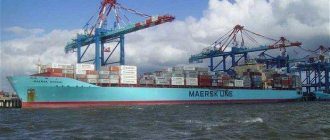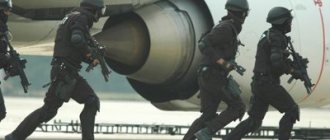1. Violation of traffic safety rules and operation of railway, air, sea and inland water transport and the metro by a person who, by virtue of the work performed or position held, is obliged to comply with these rules, except for the cases provided for in Article 271.1 of this Code, as well as the refusal of the specified person to comply of their labor duties in the case where such refusal is prohibited by law, if these acts negligently entailed the infliction of serious harm to human health or the infliction of major damage -
shall be punishable by a fine in the amount of one hundred thousand to three hundred thousand rubles, or in the amount of the wages or other income of the convicted person for a period of one to two years, or by restriction of freedom for a term of up to four years, or by forced labor for a term of up to two years with deprivation of the right to occupy certain positions or engage in certain activities for a term of up to three years or without it, or arrest for a term of up to six months, or imprisonment for a term of up to two years with deprivation of the right to hold certain positions or engage in certain activities for a term of up to three years or without it.
1.1. Violation of safety rules for traffic and operation of air, sea and inland water transport by a person operating a light (ultra-light) aircraft or small craft, except for the cases provided for in part one of this article and Article 271.1 of this Code, if these actions negligently entailed the infliction of grievous harm human health or causing major damage, -
shall be punishable by a fine in the amount of one hundred thousand to three hundred thousand rubles, or in the amount of the wages or other income of the convicted person for a period of one to two years, or by restriction of liberty for a term of up to four years, or by forced labor for a term of up to two years with deprivation of the right to occupy certain positions or engage in certain activities for a term of up to three years or without it, or arrest for a term of up to six months, or imprisonment for a term of up to two years with deprivation of the right to hold certain positions or engage in certain activities for a term of up to three years or without it.
1.2. Acts provided for in parts one and one.1 of this article, committed by a person in a state of intoxication, resulting through negligence in causing grievous harm to human health, -
shall be punishable by forced labor for a term of up to five years with deprivation of the right to hold certain positions or engage in certain activities for a term of up to three years, or imprisonment for a term of three to seven years with deprivation of the right to hold certain positions or engage in certain activities for a term of up to three years.
2. Acts provided for in parts one and one.1 of this article, resulting in the death of a person through negligence, -
shall be punished by forced labor for a term of up to five years or imprisonment for the same term.
2.1. Acts provided for in parts one and one.1 of this article, committed by a person in a state of intoxication, resulting in the death of a person through negligence, -
shall be punished by imprisonment for a term of five to twelve years.
3. Acts provided for in parts one and one.1 of this article, resulting in the death of two or more persons through negligence, -
shall be punishable by forced labor for a term of up to five years or imprisonment for a term of up to seven years.
4. Acts provided for in parts one and one.1 of this article, committed by a person in a state of intoxication, resulting in the death of two or more persons through negligence, -
shall be punished by imprisonment for a term of eight to fifteen years.
Note. In this article, major damage is defined as damage the amount of which exceeds one million rubles.
- Article 262. Violation of the regime of specially protected natural territories and natural objects
- Article 263.1. Violation of transport security requirements
Commentary to Art. 263 of the Criminal Code of the Russian Federation
The main object of the crime is the safety of traffic and operation in railway, air and water transport, an additional object is the life and health of people. The subject of the crime is the types of transport listed in the disposition of the norm under consideration.
The concept of railway transport is given in the Federal Law of January 10, 2003 N 17-FZ “On railway transport in the Russian Federation”. Article 1 of this Law determines that railway transport in the Russian Federation consists of public railway transport, non-public railway transport, as well as technological railway transport of organizations intended for moving goods in the territories of these organizations and performing initial and final operations with railway rolling stock for own needs of these organizations. In accordance with Art. 2 public railway transport is a production and technological complex, which includes railway transport infrastructure, railway rolling stock, other property and is intended to meet the needs of individuals, legal entities and the state in transportation by rail under the terms of a public contract, as well as in fulfilling other works (services) related to such transportation.
———————————
NW RF. 2003. N 2. Art. 169.
Non-public railway transport is a set of production and technological complexes, including non-public railway tracks, buildings, structures, structures, in some cases - railway rolling stock, as well as other property and intended to meet the needs of individuals and legal entities for work ( services) in non-public areas on the basis of contracts or for one’s own needs.
Air transport consists of civil aviation and aeronautics (airplanes, helicopters, gliders, airships, balloons).
Water transport is one of the types of transport administered by the Russian Federation and is a production and technological complex with its constituent organizations engaged in shipping and other shipping-related activities on waterways.
A vessel is a self-propelled or non-self-propelled floating structure used for navigation purposes, including a mixed (river-sea) navigation vessel, ferry, dredging and bottom cleaning equipment, a floating crane and other technical structures of this kind.
The subject of the crime in question can only be a self-propelled transport vessel, i.e. a self-propelled vessel that transports cargo, passengers and their luggage, postal items, tows ships and other floating objects. A non-self-propelled vessel has no independent transport significance, since its movement is carried out by towing in combination with a self-propelled transport vessel, the improper operation of which can cause damage to objects protected by law.
Military aircraft and water vehicles are not the subject of a crime under Art. 263 of the Criminal Code of the Russian Federation. Responsibility for violating the rules of operation of these devices is established by special norms (Articles 351, 352 of the Criminal Code of the Russian Federation).
The objective side consists of actions expressed in violation of traffic safety rules and operation of railway, air, sea and river transport.
The location of operation (river, lake, sea, ocean) does not matter for the existence of a crime.
A mandatory sign of the objective side is consequences in the form of causing serious harm to human health through negligence. Material composition. An act can be committed by action or by inaction (for example, driving through a prohibiting signal or failing to give such a signal in a timely manner). A person is liable for inaction only if he was entrusted with the obligation to perform certain actions.
The disposition is of a blanket nature and refers to numerous laws, regulations and instructions that establish the rules of movement and operation of these types of transport (for example, the Air Code of the Russian Federation of 1997, the Code of Inland Water Transport of the Russian Federation of 2001, the Federal Law “On Railway Transport of the Russian Federation” 2003, Charter of Railway Transport of the Russian Federation, Federal Aviation Rules, etc.). Safety in maritime transport is regulated, for example, by the International Convention for the Safety of Life at Sea, 1974, and the UN Convention on the Law of the Sea, 1982.
Criminal liability occurs in case of violation of both traffic safety rules and operating rules that ensure traffic safety. At the same time, the concept of transport operation is broader than the concept of traffic, since it includes the rules of operation (use) not only of vehicles themselves, but also of units, structures, systems that ensure the normal, accident-free movement of railway, air or water transport.
Violation of traffic safety rules is a failure to comply or improper compliance with any traffic safety rule for a specific type of transport. Violation of operating rules is a violation of technical regulations established to ensure traffic safety.
Attention should be paid to the fact that the objective side of the crime can be formed by a violation of the instructions not only of normative legal acts, which are called rules, but also of other acts, called differently, but establishing rules containing instructions for the movement or operation of transport. Violation of advisory norms does not constitute a crime, since they are not mandatory.
When deciding whether there is a crime, the specific rule that was violated by the perpetrator must be precisely determined.
The subjective side is characterized by a careless form of guilt in the form of frivolity or negligence. The culprit foresees the possibility of causing serious harm to human health as a result of violating traffic safety rules and operating transport, but without sufficient grounds for this, he arrogantly hopes to prevent them (criminal frivolity). In case of criminal negligence, a person does not foresee the occurrence of harmful consequences, although with the necessary care and forethought he should and could have foreseen them.
A special subject of a crime is a person who is obliged to comply with the rules of traffic safety and operation of transport by virtue of the work performed or the position held. This obligation must be determined on the basis of relevant regulatory legal acts.
It is also necessary to pay attention to the fact that the subject of the crime in question will only occur if the person who violated the rules of traffic safety or operation of transport, firstly, is employed in the railway, air or water transport system and, secondly, secondly, violated certain rules while performing his duties (when a person performs or must perform official functions). In all other cases, the act of the perpetrator should be qualified under other articles of the Criminal Code of the Russian Federation, for example, under articles establishing liability for crimes against the person. The issue of liability is resolved in a similar way in cases where the rules are violated by a person who is not an employee of the system of the modes of transport in question.
The elements of violation of traffic safety rules and operation of railway, air or water transport (Article 263 of the Criminal Code of the Russian Federation) should be distinguished from the elements of violation of labor protection rules (Article 143 of the Criminal Code of the Russian Federation). The distinction is made primarily by the nature of the rules being violated. Violation of labor safety rules consists of violations of the requirements that are established for the administration of institutions, organizations for the proper maintenance of structures, equipment, provision of safety devices, etc., violations of the requirements for all employees to comply with safe work methods and techniques. These requirements together form the labor safety rules.
The rules for traffic safety and operation of transport concern only these aspects of a person’s activity. All actions (inaction) that are not related to non-compliance with these rules cannot be qualified under Art. 263 of the Criminal Code of the Russian Federation. In case of violation of traffic and transport safety rules and labor safety rules, the act must be classified as a set of crimes.
In addition, the victim in the commission of a crime under Art. 263 of the Criminal Code of the Russian Federation, there can be any person (both an employee of a certain type of transport system and another person, for example, a passenger, a passer-by), and the victim as a result of violations of labor protection rules is only a person who is in an employment relationship with the institution, organization where it was the act has been committed.
Liability under Part 2 of Art. 263 of the Criminal Code of the Russian Federation occurs in the case of careless causing of death to a person while committing the same act.
A sign of a particularly qualified group (Part 3 of Article 263 of the Criminal Code of the Russian Federation) is causing death by negligence to two or more persons.
Judicial practice under Article 263 of the Criminal Code of the Russian Federation
Resolution of the ECHR dated October 3, 2017
7. The Main Military Prosecutor's Office began an official investigation into the incident on the basis of part three of Article 263 of the Criminal Code of the Russian Federation (“Violation of safety rules for the operation of transport, resulting in the death of two or more persons through negligence”) in the framework of case No. 29/00 /0016-00 (hereinafter referred to as the investigation).
Determination of the Constitutional Court of the Russian Federation dated June 27, 2017 N 1437-O
ARTICLE 263 OF THE CRIMINAL CODE OF THE RUSSIAN FEDERATION, PART ONE AND POINT 3 OF PART TWO ARTICLE 75, POINT 1 OF PART ONE AND PART TWO ARTICLE 140, PART ONE ARTICLE 144, PART EIGHTH ARTICLE 151 CRIMINAL PROCEDURE CODE
Determination of the Constitutional Court of the Russian Federation dated 07/08/2021 N 1373-O
The criminal law establishes a system of special norms aimed at ensuring safety in certain areas of life, characterized by increased requirements for the behavior of subjects (in particular, articles 143, 215, 216, 217, 218, 219, 236, 247, 263, 264, 268, 350 of the Criminal Code of the Russian Federation). In such relations, their participants act as special subjects called upon to comply with a set of rules that ensure both individual safety and the general security of life and health of a wide (indefinite) circle of people. Failure to comply (violate) the requirements of special norms in itself creates a danger of causing harm to the life and health of people and other objects of criminal legal protection.
Determination of the Judicial Collegium for Criminal Cases of the Supreme Court of the Russian Federation dated September 23, 2021 N 49-UD21-25-K6
convicted under Part 3 of Art. 263 of the Criminal Code of the Russian Federation to 4 years of imprisonment with serving the sentence in a penal colony, using Part 3 of Art. The Criminal Code of the Russian Federation imposed an additional punishment in the form of deprivation of the right to hold the position of “station duty officer.” A.S. Kolesnikov was convicted by the same sentence. and Prolomova E.A.
Determination of the Judicial Collegium for Civil Cases of the Supreme Court of the Russian Federation dated 03/02/2020 N 56-КГ19-26
On June 4, 2022, the senior investigator of the Primorsky Investigation Department for Transport of the Far Eastern Investigation Department for Transport of the Investigative Committee of the Russian Federation issued a decision to refuse to initiate a criminal case under Part 1 of Article 263 of the Criminal Code of the Russian Federation (violation of traffic safety rules and operation of railway, air, sea and inland water transport and metro) under paragraph 2 of part 1 of article 24 of the Criminal Procedure Code of the Russian Federation due to the absence of corpus delicti in the act; under Article 110 of the Criminal Code of the Russian Federation (incitement to suicide) - under paragraph 1 of part 1 of Article 24 of the Criminal Procedure Code of the Russian Federation due to the absence of a crime.
Determination of the Constitutional Court of the Russian Federation dated December 14, 2021 N 2649-O
3. The criminal law has a system of special norms aimed at ensuring safety in certain areas of life, characterized by increased requirements for the behavior of subjects (in particular, articles 143, 215, 216, 217, 218, 219, 236, 247, 263, 264, 268 and 350 of the Criminal Code of the Russian Federation). In such relations, their participants act as special subjects called upon to comply with a set of rules that ensure both individual safety and the general security of life and health of a wide range of people. Violation of the requirements of special norms in itself creates a danger of harm to life and health, and other objects of criminal legal protection (Determination of the Constitutional Court of the Russian Federation of July 8, 2022 N 1373-O). At the same time, liability for careless causing of death is provided both in the general rule, which is Article 109 of the Criminal Code of the Russian Federation, and in special rules on liability for violation of rules aimed at reducing the risks of a particular type of activity, including rules ensuring labor protection for workers, industrial safety of hazardous production facilities or safety of construction and other potentially hazardous work (Articles 143, 216 and 217 of the Criminal Code of the Russian Federation).
Determination of the Judicial Collegium for Civil Cases of the Supreme Court of the Russian Federation dated 07/08/2019 N 56-KGPR19-7
On October 10, 2022, the investigator of the Far Eastern Investigation Department for Transport of the Investigative Committee of the Russian Federation issued a resolution to terminate the criminal case: against the driver Voronin Yu.V. and assistant driver Zaiko V.Yu., who were driving the shunting diesel locomotive, - due to the absence in their actions of the elements of crime provided for in Part 3 of Article 263 (violation of traffic safety rules and operation of railway, air, sea and inland water transport and the subway, resulting in negligence death of two or more persons), Article 125 (leaving in danger) of the Criminal Code of the Russian Federation, in relation to the driver Myasnikov D.S. and assistant driver Savorovsky P.V. - due to the lack of corpus delicti in their actions as provided for in Part 3 of Article 263 of the Criminal Code of the Russian Federation.
Determination of the Judicial Collegium for Civil Cases of the Supreme Court of the Russian Federation dated January 22, 2019 N 4-КГ18-91
By a resolution of the senior investigator of the Chelyabinsk Transport Prosecutor's Office dated May 6, 2007, the initiation of a criminal case was refused due to the lack of corpus delicti in the actions of the train driver as provided for in Part 1 of Article 263 of the Criminal Code of the Russian Federation. The decision of the Sovetsky District Court of Chelyabinsk dated December 10, 2012 with JSC Russian Railways in favor of Kunstman E.V. entered into legal force. compensation for moral damage in the amount of 120,000 rubles was recovered.
Everything about criminal cases
Go to the Criminal Code
Url Additional information:
Part
I
(up to 2 years)
- Part 1 263 of the Criminal Code
violation of railway transport safety rules
Part 1.1
(up to 5 years)
- Part 1.1 263 of the Criminal Code
causing serious harm to human health
Part 1.2
(37 years)
- Part 1.2 263 of the Criminal Code
committed by a person in a state of intoxication
Part
II
(up to 5 years)
- Part 2 263 of the Criminal Code
resulting in the death of a person
Part 2.1
(5 – 12 years)
— part 2.1 263 of the Criminal Code
while intoxicated resulting in the death of a person
Part
III
(up to 7 years)
- Part 3 263 of the Criminal Code
causing the death of two or more persons
Part
IV
(8 - 15 years)
- Part 4 263 of the Criminal Code
while intoxicated causing the death of two or more persons
Note
— note
major damage 1,000,000
Plenum of the Supreme Court
— P.
Plenum No. 23, the civil defendant under this article is the owner
Article 263 of the Criminal Code. Violation of safety rules for railway and air transport
1) Violation of traffic safety rules and operation of railway, air, sea and inland water transport and the metro, by a person, by virtue of the work performed or position held, is obliged to comply with these rules, except for the cases provided for in Article 271.1 of the Criminal Code,
- as well as the refusal of the specified person to perform his labor duties in the case where such refusal is prohibited by law, if these actions negligently entailed:
— causing serious harm to human health;
- or causing major damage,
punishable:
| 1 | fine | 100.000 — 300.000 |
| 2 | restriction of freedom | up to 4 years |
| 3 | forced labor + with deprivation of rights for up to 3 years (or without) | up to 2 years |
| 4 | arrest | up to 6 months |
| 5 | imprisonment + with deprivation of rights for up to 3 years (or without) | up to 2 years |
1.1) Violation of traffic safety rules and operation of air, sea and inland water transport by a person operating a light (ultra-light) aircraft or small craft, except for the cases provided for in Part 1 of this article and Article 271.1 of the Criminal Code, if these acts negligently caused serious harm to human health or causing major damage
,
punishable:
| 1 | fine | 100.000 — 300.000 |
| 2 | restriction of freedom | up to 4 years |
| 3 | forced labor + with deprivation of rights for up to 3 years (or without) | up to 2 years |
| 4 | arrest | up to 6 months |
| 5 | imprisonment + with deprivation of rights for up to 3 years (or without) | up to 2 years |
1.2) Acts provided for in Part 1.1 and Part 1.2 of this article, committed by a person in a state of intoxication, which through negligence resulted in the infliction of grievous harm to human health,
are punished:
| 1 | forced labor + with deprivation of rights for up to 3 years (or without) | up to 5 years |
| 2 | imprisonment + with deprivation of rights for up to 3 years (or without) | 37 years |
2) Acts provided for in Part 1 and Part 1.1 of this article, resulting in the death of a person through negligence,
are punished:
| 1 | forced labor | up to 5 years |
| 2 | imprisonment + with a fine of up to 500,000 (or without) | up to 5 years |
2.1). Acts provided for in Part 1 and Part 1.1 of this article, committed by a person in a state of intoxication, resulting in the death of a person through negligence,
are punished:
| imprisonment | 5 – 12 years |
3) Acts provided for in Part 1 and Part 1.1 of this article, resulting in the death of two or more persons through negligence,
are punished:
| 1 | forced labor | up to 5 years |
| 2 | imprisonment | up to 7 years |
4). Acts provided for in Part 1 and Part 1.1 of this article, committed by a person in a state of intoxication, resulting in the death of two or more persons through negligence,
are punished:
| imprisonment | 8 – 15 years |
Note.
In this article, major damage is defined as damage the amount of which exceeds 1,000,000 rubles.
Return to the Criminal Code
Seek advice





